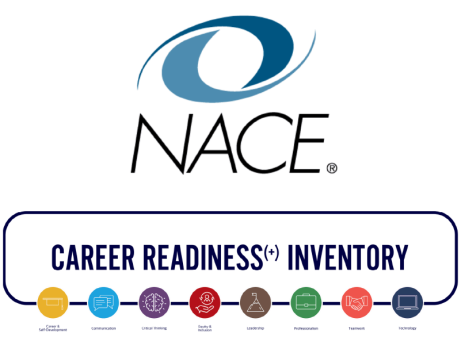Are you career ready?
Career readiness is consistently recognized as a key to successful transition from college to your first professional experience, like an internship, co-op or full time position after graduation. This serves as a foundation that you can be building now to ensure that you have the skills and experiences that can position you for success.
Assess your career readiness
Career Launch can help you explore your career readiness and identify ways in which you can grow the professional skills most valued by employers. Take this quick inventory in less than 10 minutes and get an immediate result and rating across each of the 8 Career Readiness Competencies that are highly-sought after by employers.
Your results will be emailed directly to you and will include a comparison of your ratings to the competencies employers say are most important in college students and recommendations on how to further develop each competency.

Nearly two-thirds of employers use skills-based hiring practices for new entry-level hires.
Understand the career readiness competencies
Success after graduation isn’t just about having a degree—it’s about having the right skills. The National Association of Colleges and Employers (NACE) identifies eight key career competencies that employers seek in college graduates. Developing these skills now can help you stand out in job applications, internships, and beyond.
Career & Self-Development
Take charge of your future by actively exploring career options, seeking feedback, and pursuing opportunities to grow. Whether it’s through internships, mentorships, or professional development, continuous learning helps you stay competitive.
Communication
Strong communication skills—both written and verbal—are essential in any career. Employers look for candidates who can articulate ideas clearly, listen actively, and tailor messages to different audiences.
Critical Thinking
Problem-solving is a must in any workplace. Developing critical thinking means analyzing issues, evaluating evidence, and making informed decisions. Employers value individuals who can approach challenges with logic and creativity.
Equity & Inclusion
Creating inclusive workplaces starts with understanding diverse perspectives and fostering an environment where everyone feels valued. Employers seek individuals who are open-minded, culturally aware, and committed to equity.
Leadership
Leadership isn’t just about a job title—it’s about inspiring and motivating others. Whether leading a team project or mentoring peers, developing leadership skills helps you take initiative and create positive change.
Professionalism
Workplace success relies on reliability, accountability, and ethical behavior. Demonstrating professionalism means managing responsibilities effectively, meeting deadlines, and maintaining a strong work ethic.
Teamwork
Collaboration is key in nearly every industry. Employers want team players who can build relationships, manage conflicts, and contribute to group success while respecting diverse perspectives.
Technology
In a digital world, tech skills are essential. From mastering workplace software to adapting to new tools, staying tech-savvy ensures you remain relevant in today’s fast-changing job market.
Build Your Skills Today
You don’t have to wait until graduation to develop these competencies. Get involved on campus, take on leadership roles, apply for internships, and seek out professional development opportunities. The more you practice these skills now, the more prepared you’ll be for your future career.

